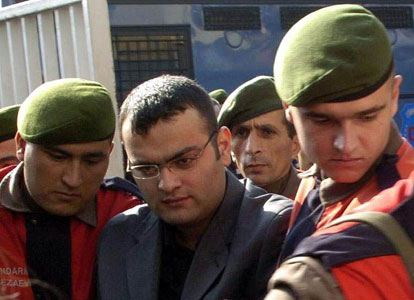BARÇIN YINANÇ
Hürriyet Daily News
With already-troubled Turkey-U.S. ties further challenged by NATO plans for a missile defense system, Washington is now attempting to use one of the touchiest issues in the two countries’ relationship to gain Turkish cooperation.
Frustrated by the growing divergence of views, the United States has warned Turkey that it will not be able to block the adoption by the U.S. Congress of a resolution based on Armenian genocide claims, the Hürriyet Daily News & Economic Review has learned.
In official talks with Turkish authorities, U.S. officials said Ankara’s policies on Iran, tensions with Israel and position on the anti-missile system would determine the course of Turkish-American relations and be a test case for how Turkey wants to position itself going forward. Unless there is some improvement in these three areas, Washington made clear through diplomatic channels, Turkey should not be surprised to see a resolution recognizing Armenian claims of genocide pass before the end of the year.
“The perception that Turkey and the U.S. work for opposing aims makes it difficult for us to work together,” Philip Gordon from the U.S. State Department said at an American Turkish Council meeting Tuesday in Washington. “Whether the rhetoric that Turkey is heading East is right or wrong, as long as some think like that, we will have problems.”
If Turkey blocks NATO’s missile-defense plans, it will lose credibility within the alliance and strengthen views that Turkey is drifting apart from the West, said Serdar Erdurmaz, a former army official now with the Turkish Center for International Relations and Strategic Analysis, or TÜRKSAM.
“At the end of the day, the decision to say yes or no to NATO will be a test for Turkish foreign policy identity and the concept of belonging,” journalist Sami Kohen wrote in his column in daily Milliyet on Tuesday.
Kohen believes the skepticism about Turkey stems from its recent opening to the Middle East and its strong ties with Iran. “It is important that Turkey is careful to avoid road accidents about these initiatives. But if NATO and its Western allies carry importance for Turkey, then it should avoid confrontations that will irritate them,” he wrote in the same column.
The anti-missile system is only the latest headache in Turkish-U.S. relations, which ebbed after Ankara’s refusal to allow U.S. troops to cross its territory to invade Iraq in 2003 and have been hard to get back on track since.
New U.S. plans to have NATO endorse an anti-missile system and to deploy certain elements of the new mechanism in Turkey have met objections from the ruling Justice and Development Party, or AKP, government, further deteriorating the already-negative atmosphere between the two countries.
Washington portrays the missile-defense system as a safeguard against a possible ballistic missile strike from Iran, but Ankara is concerned that hosting the shield could damage relations with its neighbor. Turkey has said it does not want the system to specifically identify any neighboring country.
The missile-defense issue is not the first time the two allies have disagreed over Iran; relations became increasingly tense in June following Turkey’s dissenting vote in the U.N. Security Council against fresh sanctions on the Islamic republic. The United States has also expressed concern about the unraveling ties between Turkey and Israel – both key U.S. allies in the region – in the wake of Israel’s 2008 invasion of Gaza and its deadly raid May 31 on a Turkish aid ship seeking to run the blockade on the isolated strip.
These developments have deepened concerns that Turkish policy is tilting outside the West’s sphere of influence, and according to Gordon, prompted the asking in the U.S. Congress of more and more questions about Turkey.
Congressional committees have previously approved resolutions calling on the president to recognize Armenian claims that up to 1.5 million of their kin perished in orchestrated killings and deportations under the Ottoman Empire in 1915-1917.
Turkey counters that 300,000 to 500,000 Armenians and at least as many Turks perished in what was a civil strife when Armenians rose up against their Ottoman rulers and sided with Russian forces invading the crumbling empire.










